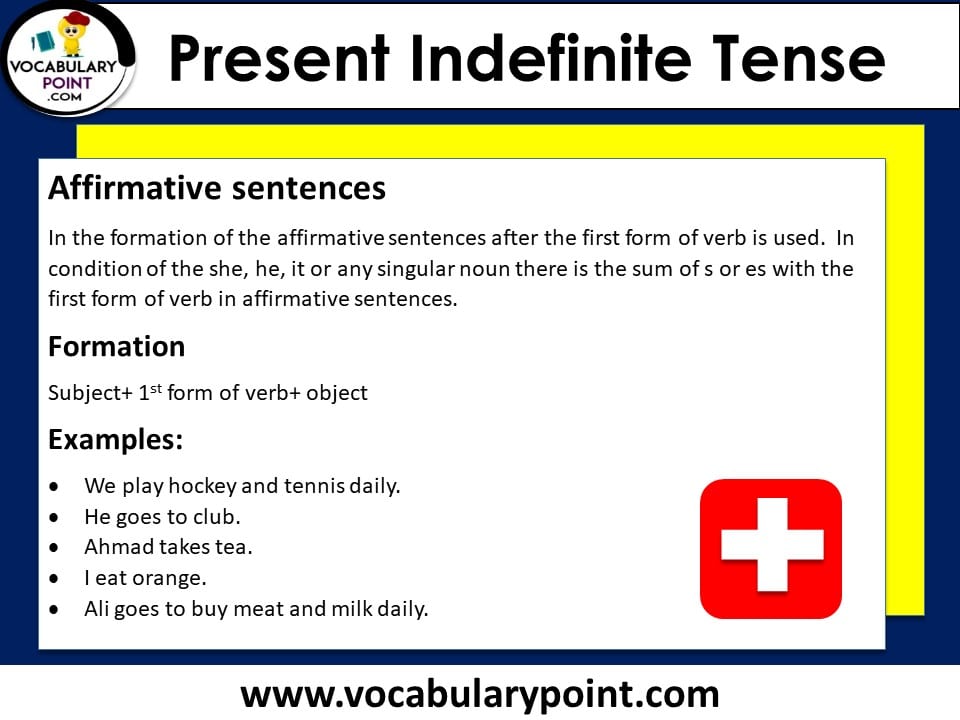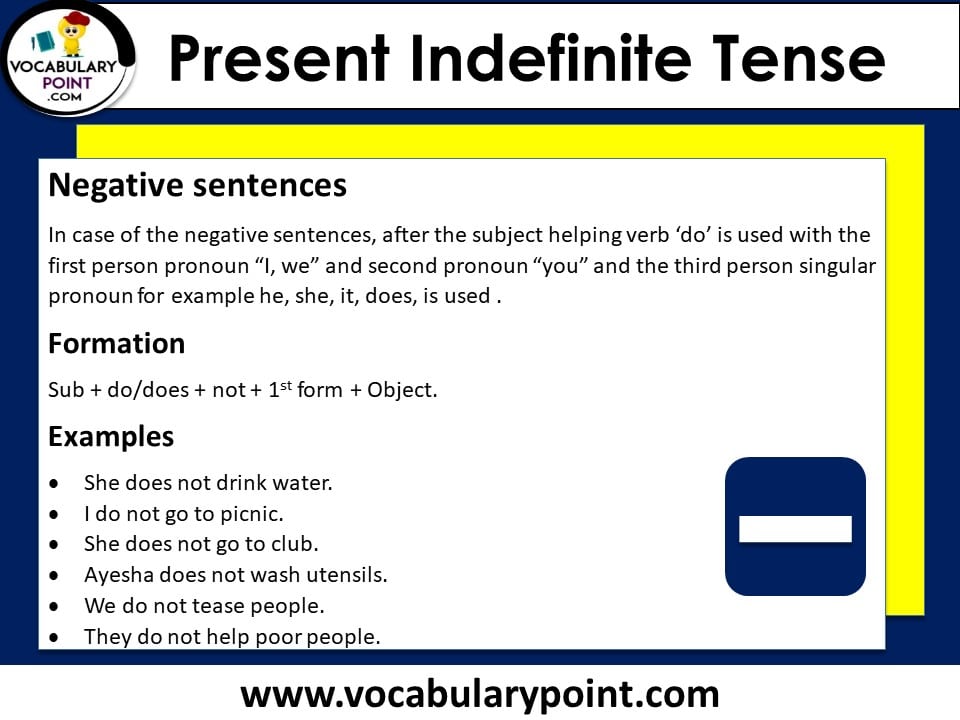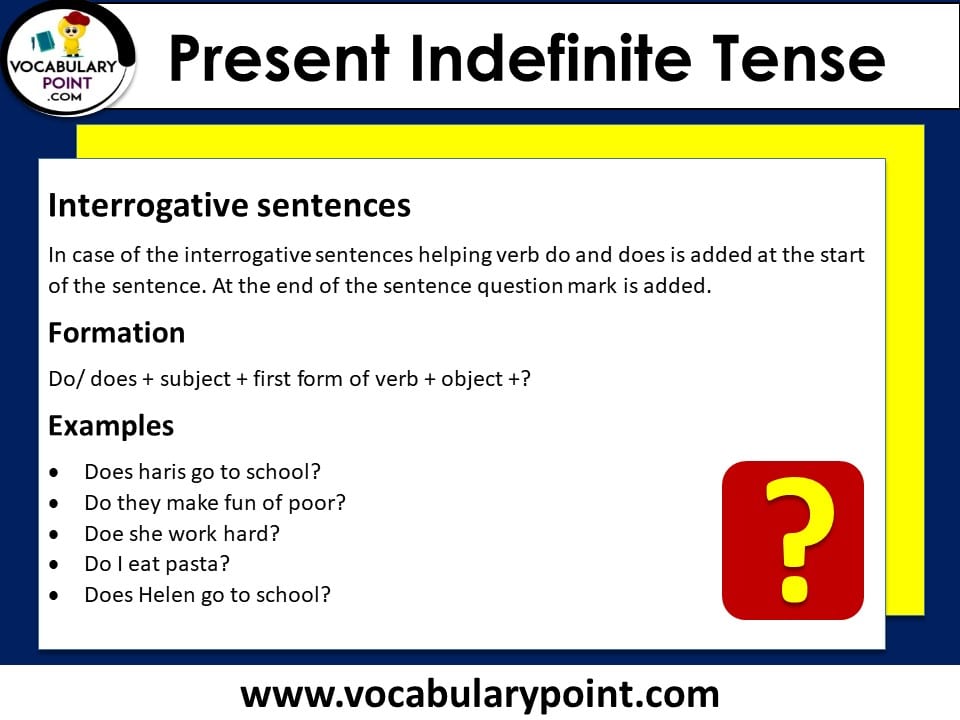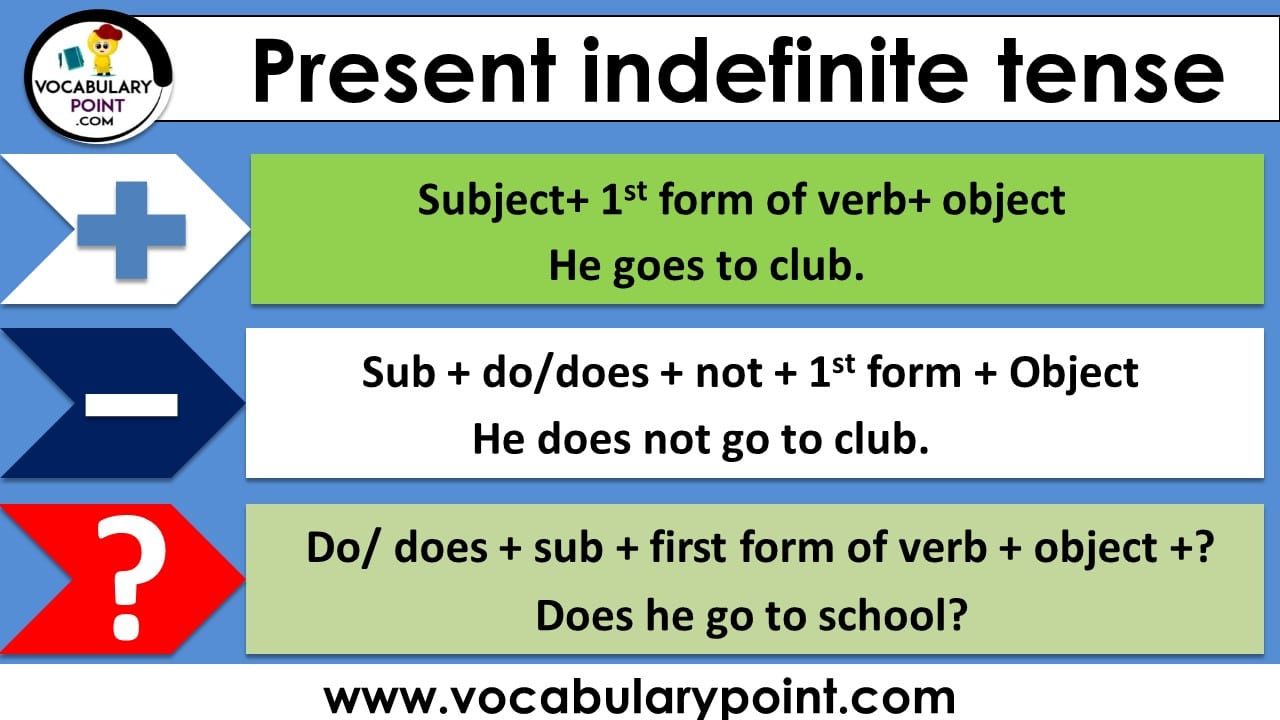Present indefinite tense, examples, sentences and their formation.The present indefinite tense is an incredibly important grammar concept for English language learners, as it is one of the most commonly used verb tenses in the language. It can be used to talk about habits, routines, general truths and facts, and current states of being. This article will provide a comprehensive overview of the present indefinite tense, including its formation, uses, and common mistakes to avoid.se
Present Indefinite Tense
Present indefinite tense shows that the action is going to take place in present time.
- In present indefinite tenses 1st form of verb is used.
- If the subject contains (he, she, it or a single name) then there is addition of s or es with verb.
- Do and Does are used as helping verb in case of negative or interrogative sentences.
Formation
Subject+ 1st form of verb+ object
You would like to read: Present Continuous Tense
Affirmative sentences
In the formation of the affirmative sentences after the first form of verb is used. In condition of the she, he, it or any singular noun there is the sum of s or es with the first form of verb in affirmative sentences.
Formation
Subject+ 1st form of verb+ object
Examples:
HERE ARE SOME EXAMPLES OF PRESENT INDEFINITE TENSE:
- She drinks coffee every morning.
- They visit their grandparents once a month.
- The sun rises in the east.
- The birds fly south in winter.
- I study English every day.
- He plays soccer on weekends.
- We have lunch at noon.
- She reads a book before bedtime.
- They walk to work every day.
- The train arrives at the station at 5 PM.
- The flowers bloom in the spring.
- He always wears a suit to work.
- The children play in the park after school.
- I watch TV in the evenings.
- She speaks Spanish fluently.
- The company holds a meeting once a week.
- They listen to music while driving.
- The river flows into the ocean.
- I cook dinner for my family every night.
- He rides his bike for exercise every day.
- We play hockey and tennis daily.
- He goes to club.
- Ahmad takes tea.
- I eat orange.
- Ali goes to buy meat and milk daily.
- You learn your lesson.
- She worked hard.
- Usama goes to college.
- Shams take a bath daily.

- We offer prayers five times a day.
- You waste your time.
- The sun rises in the east.
- We follow the teachings of the Holy Quran.
- He goes to school regularly.
- He eats grapes.
- I play cricket.
- She learns her lesson.
- We pluck flowers.
- She knocks at the door.
- They enjoy spring holidays.
- She read a story book.
- You write a letter.
- We go to college.
- She is a beautiful girl.
- He takes a bath.
- I write a new article.
- I eat mangoes.
- He takes tea
- I read newspaper daily.
- I love spending time with my family.
- The sun is shining brightly in the sky today.
- She is an amazing dancer.
- The flowers in the garden are blooming beautifully.
- He is an excellent cook.
- The new restaurant in town has delicious food.
- My best friend is always there for me when I need her.
- The ocean is so peaceful and calming.
- She has a contagious smile.
- My favorite color is purple.
- The book I am reading is very interesting.
- The movie we watched last night was very entertaining.
- The park is a great place to go for a walk.
- The music in the background is very soothing.
- She has a wonderful singing voice.
- The mountains are so majestic and breathtaking.
- The beach is the perfect place to relax and unwind.
- My new job is challenging but rewarding.
- The artwork on the wall is beautiful and inspiring.
- I am grateful for all the wonderful opportunities in my life.
Negative sentences
In case of the negative sentences, after the subject helping verb ‘do’ is used with the first person pronoun “I, we” and second pronoun “you” and the third person singular pronoun for example he, she, it, does, is used .
Formation
Sub + do/does + not + 1st form + Object.
Examples
- She does not drink water.
- I do not go to picnic.
- She does not go to club.
- Ayesha does not wash utensils.
- We do not tease people.
- They do not help poor people.
- Irma does not wash clothes.
- Helen does not go to school.
- Islam does not tease everyone.
- Sana does not take a bath daily.
- I do not like spicy food.
- The weather today is not very nice.
- She does not speak Spanish fluently.
- The movie we watched last night was not very good.
- He is not a fan of horror movies.
- The concert was canceled due to bad weather.
- My phone is not working properly.
- She did not receive the promotion she was hoping for.
- The restaurant was not very clean.
- I cannot find my keys anywhere.
- He does not have any experience in this field.
- The product was not as advertised.
- The traffic this morning was terrible.
- She is not feeling well today.
- The price of gas has not gone down.
- I have not had time to finish my homework.
- He did not enjoy the party very much.
- The service at the hotel was not very good.
- She is not a morning person.
- The internet connection is not very reliable.

- We do not offer prayers five times a day.
- You do not waste your time.
- The sun does not rise in the east.
- We do not follow the teaching of the Holy Quran.
- He does not go to school regularly.
- He does not eat grapes.
- He does not knock at the door.
- She does not learn her lesson.
- We do not pluck flowers.
- They do not enjoy the spring holidays.
- She does not read a story book.
- You do not write a letter.
- We do not go to college.
- She does not a beautiful girl.
- I do not read newspaper daily.
- I does not eat mango.
- I do not write a new article.
- He does not take a bath daily.
- I do not play cricket.
- He does not take tea.
Interrogative sentences
In case of the interrogative sentences helping verb do and does is added at the start of the sentence. At the end of the sentence question mark is added.
Formation
Do/ does + subject + first form of verb + object +?
Examples
- Does haris go to school?
- Do they make fun of poor?
- Doe she work hard?
- Do I eat pasta?
- Does Helen go to school?

- Do we offer prayers five times a day?
- Do you waste your time?
- Does the sun rise in the east?
- Do we follow the teaching of the Holy Quran daily?
- Does he go to school regularly?
- Does he eat grapes?
- Do I play cricket?
- Does he knock at the door?
- Does she learn her lesson?
- Do we pluck the flowers?
- Do they enjoy spring holidays?
- Does she read a story book?
- Do you write a letter?
- Does the bell ring?
- Does he take tea?
- Do I write a new article?
- Does she is a beautiful girl?
- Does he take a bath daily?
- Do I read newspaper daily?
- Does I eat mango?
Examples of Present indefinite tense with structur:
The present indefinite tense is used to describe actions that are currently happening or actions that happen regularly. The structure of the present indefinite tense is as follows:
Subject + Verb (base form) + Object
- I play tennis every weekend. (Subject: I, Verb: play, Object: tennis) This sentence describes a regular action that the speaker performs every weekend.
- She sings beautifully in the choir. (Subject: She, Verb: sings, Object: in the choir) This sentence describes a current action that the subject is performing in the present.
- He writes a new song every day. (Subject: He, Verb: writes, Object: a new song) This sentence describes a regular action that the subject performs every day.
- They speak three languages fluently. (Subject: They, Verb: speak, Object: three languages) This sentence describes a current ability that the subject possesses.
- The birds chirp in the morning. (Subject: The birds, Verb: chirp, Object: in the morning) This sentence describes a regular action that occurs every morning.
- We walk to the park every day. (Subject: We, Verb: walk, Object: to the park) This sentence describes a regular action that the speakers perform every day.
- The sun rises in the east and sets in the west. (Subject: The sun, Verb: rises/sets, Object: in the east/in the west) This sentence describes a natural occurrence that happens regularly.
- You learn something new every day. (Subject: You, Verb: learn, Object: something new) This sentence describes a regular action that the listener should perform every day.
- The dog barks loudly at strangers. (Subject: The dog, Verb: barks, Object: loudly at strangers) This sentence describes a current action that the subject is performing in the present.
- She studies hard for her exams. (Subject: She, Verb: studies, Object: hard for her exams) This sentence describes a current action that the subject is performing in the present.
- He paints beautiful landscapes. (Subject: He, Verb: paints, Object: beautiful landscapes) This sentence describes a current action that the subject is performing in the present.

I want to learn English
Thanks a lot for your information
Please save my name and Email in this browser for the next time
Thank you so much for sharing.